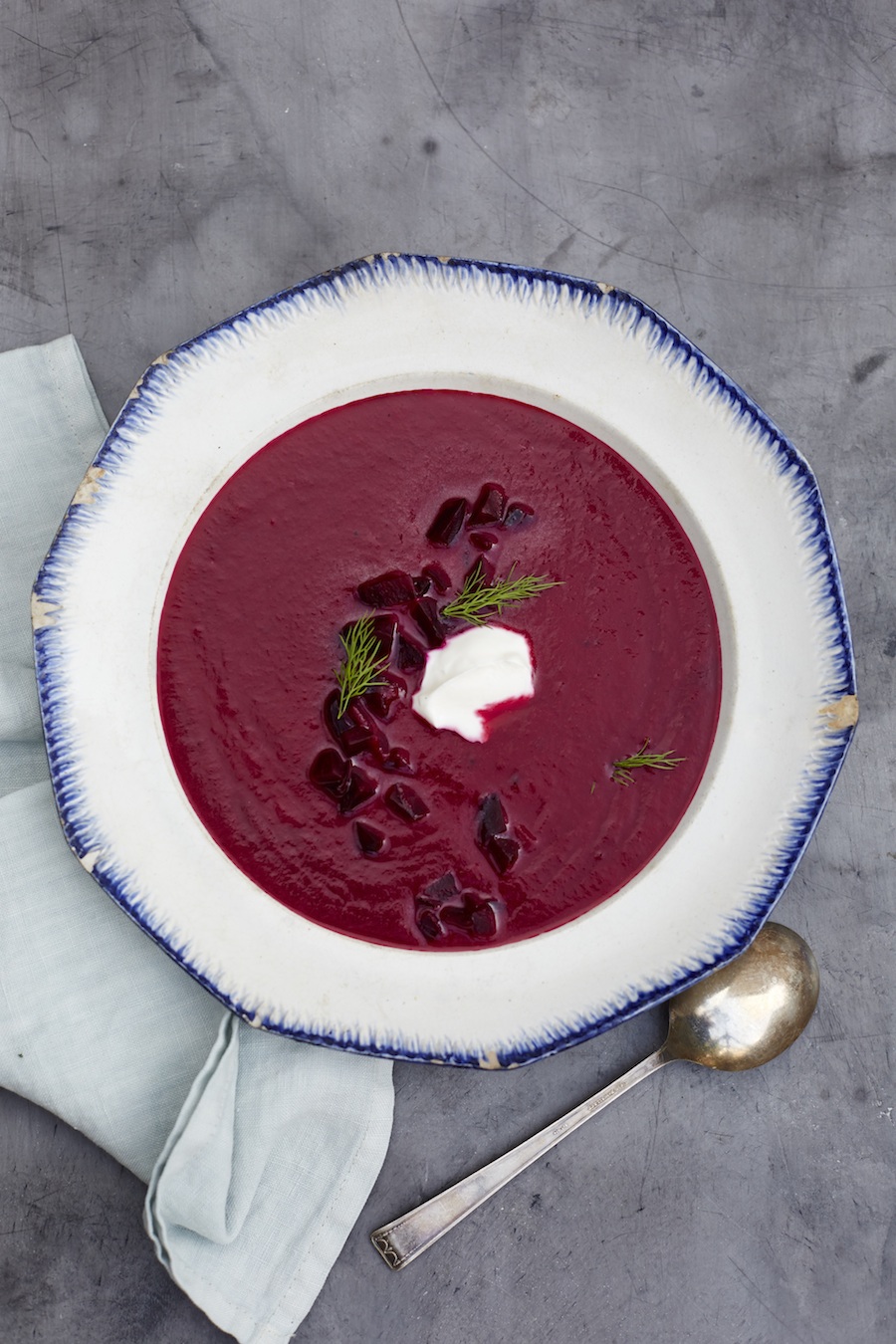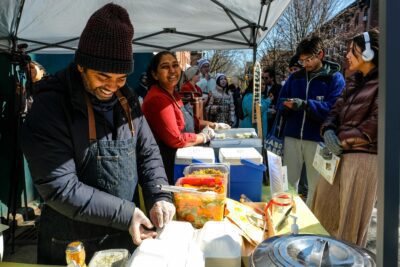Queer Soup Night: Nourishing Queers and the World At Large One Bowl at a Time
While many of us were reeling in the wake of Trump’s election, Liz Alpern decided to take action. “I realized,” she said, “when you don’t know what to do, do what you know how to do.” So Alpern, who recently co-wrote The Gefilte Manifesto, a cookbook filled with the revamped traditional Jewish recipes she serves through her company The Gefilteria, got cooking.
She created Queer Soup Night, a monthly fundraiser run out of Pel’s Pies in Prospect-Lefferts Gardens. Alpern, along with a core group of queer friends, cook soups using locally sourced ingredients and serves them to the queer community and its allies. The event is donation based and each QSN has a different beneficiary. So far, people keep coming back for seconds. QSN has raised more than $700 each night for organizations that protect the rights of Muslim Americans, queer immigrant detainees and trans women of color.
October 1st at 6:30pm will mark QSN’s fourth installment. This month’s beneficiary will be The Bronx Freedom Fund, a fund that provides bail for low income NYC residents so that they can return to their communities and jobs while awaiting trial.


Photo by Grace Chu.
Why soup?
Liz Alpern: I always dreamed of a night where I brought together my queer community and served them soup. Soup is the thing I make when I want to nourish someone. And wherever you look in the world, you’ll find soup. It is, historically, a peasant food because it can be made from all the odds and ends. It’s not precious and you don’t have to measure. That’s a part of why it is a great food to feed to community. Soup is essentially the symbol of resourcefulness and feeding a crowd.
What is so important about the link between community and food?
Chefs love to say “food brings people together” but on this very elemental level, it does. People need to eat. People also have a natural and deep need to gather and spend real time together and when you come together over a meal, it lends a sacredness to the moment. With Queer Soup Night, we also want to have a party that is not a late-night, drunken dancing party – even though I love parties like that and will go to them until the day I die. We’ve created an environment where you can have conversations, meet new people and talk about what is going on in the world while still having fun. And food facilitates that slower, more intimate energy.
How do you decide on what organizations will receive the funds raised?
We choose organizations that we know could really benefit from $700 or $800 dollars. We lean toward queer organizations, but more than that, we lean towards local organizations because we believe in giving back to the community we get support from every day.
Why is the Bronx Freedom Fund the beneficiary this month?
One of our organizers works with them and I was shocked when she told me the stats. If you can’t pay bail, you have to stay in jail until your trial, so, 92% of people who are unable to pay bail end up pleading out, even if they are innocent, and go home with a criminal record. Awaiting trial in jail also makes a person 4x more likely to spend time in prison whether they are guilty or not. Since bails are usually in the range of $300 to $1000 this is so clearly not about keeping people safe. It’s about targeting poor people and people of color. Right now, we are in a time where we are seeing threats from all angles, but, we can’t forget about the Prison Industrial Complex. Not only is it such a racist system it’s a system of control and that is something that we, as queers, really need to be fighting against. We need to be standing up for people moving freely through the world, not penalizing and silencing and shutting them away.
What’s next for Queer Soup Night?
We’re bringing in other culinary voices to contribute their talent to the nourishing of the community. At October’s QSN, DeVonn Francis is cooking with us. He is the co-founder of the Enroot Collective which does these beautiful multi-course dinners in Brooklyn that people can actually afford. At the November QSN we’re partnering with Jarry Magazine which is a queer food magazine. They’re awesome people and we want to amplify their work with the queer community as well.


Photo by Lauren Volo.
LILYA’S SUMMER BEET BORSCHT
Recipe by Liz Alpern and Jeffrey Yoskowitz, from their cookbook, The Gefilte Manifesto. Reprinted with permission from Flatiron Books. All rights reserved.
From Liz: One summer day, Jeffrey and I headed to Little Odessa in Brighton Beach, Brooklyn. We were visiting our business partner Jackie’s ninety-two-year-old Russian-born great-aunt, Lilya. She had immigrated to Brighton Beach from the Soviet Union in 1989. Lilya was known for her borscht, and she’d invited us to spend time with her while she salted and seasoned three varieties of the soup. At ninety-two, she was extraordinary, foisting shots of vodka on us and showering us with words of wisdom. We left Brighton Beach inspired and feeling lucky to have met her. She passed away a couple of years later. We developed this recipe with her in mind.
This beet borscht is perfect served chilled on summer days or served hot in the colder months. The ideal borscht, writes Aleksandar Hemon in the New Yorker of his Bosnian family traditions “contains everything . . . and it can be refrigerated and reheated in perpetuity, always better the next day . . . The crucial ingredient . . . is a large, hungry family, surviving together.” Jeffrey thinks that this recipe should utilize rossel (the brine from fermented beets, otherwise known as beet kvass) instead of vinegar to add tang, since traditionally borscht’s coveted sour flavor was cultivated by first fermenting the beets. But I disagree. I like the flavor that vinegar adds, even if it isn’t as Old World. This recipe uses vinegar (I won!), but if you’d like to be more old school and first wait a week to ferment your beets, follow the Beet and Ginger Kvass recipe (page 290) but omit the ginger. And while this recipe calls for roasting beets and adding them to the soup, it also tastes great without roasted beets. Just cut the beet amount to 1 pound if omitting the roasting step.
SERVES 6 TO 8
2 pounds whole beets, scrubbed but unpeeled
2 carrots, unpeeled and coarsely chopped
2 celery stalks with leaves, coarsely chopped
2 medium onions: 1 quartered, 1 diced
5 garlic cloves: 2 left whole, 3 minced
2 dried bay leaves
2 tablespoons kosher salt
2 tablespoons whole black peppercorns
2 tablespoons caraway seeds
4 cups cold water
2 tablespoons olive oil
3 tablespoons honey
3 tablespoons apple cider vinegar
Sour cream, storebought or homemade (page 24), or crème fraîche, for garnish
Chopped fresh dill, for garnish
- Preheat the oven to 400oF. Wrap 1 pound of the beets individually in aluminum foil and set on a baking sheet. Roast until they can be easily pierced with a fork, 40 minutes to 1 hour, depending on the size of the beets (larger beets take longer). The skin should peel off easily under cold running water. Dice the beets into bitesize pieces and refrigerate until serving.
- While the beets are roasting, in a large soup pot, combine the remaining 1 pound beets, the carrots, celery, quartered onion, whole garlic cloves, bay leaves, salt, peppercorns, caraway seeds and 9 cups water. Bring to a boil, then reduce the heat to low and simmer for 1 hour. Remove from the heat.
- Fill a large bowl with water and ice. Remove the boiled beets from the pot and place them in the ice-water bath. When cool, peel and coarsely chop them. Strain the broth through a fine-mesh strainer into a large bowl, discarding the solids.
- Rinse and dry the soup pot and set it over medium heat. Add the olive oil and diced onion and sauté until the onion is fragrant, about 3 minutes. Add the minced garlic and sauté for 3 to 5 minutes more, until the onion begins to turn golden. Add the beet broth and coarsely chopped boiled beets to the pot and simmer over low heat, covered, for about 20 minutes.
- Remove from the heat and puree the soup in the pot using an immersion blender. (Alternatively, transfer it in small batches to a standing blender and puree—just be careful!) Add the honey and vinegar and simmer over very low heat for 5 minutes.
- If serving hot, place 2 tablespoons of diced roasted beets in the bottom of each bowl and then ladle the hot soup over them. Garnishing with sour cream and chopped fresh dill. If serving chilled, remove from the heat and let the soup cool completely and then refrigerate overnight. Be sure to stir the soup well and taste immediately before serving. Once cooled, many soups require a touch more salt. If necessary, add more salt, a teaspoon at a time. As with hot borscht, place 2 tablespoons of the roasted beets at the bottom of the bowl and ladle the soup on top. Serve garnished with sour cream and chopped fresh dill.
You might also like 




















